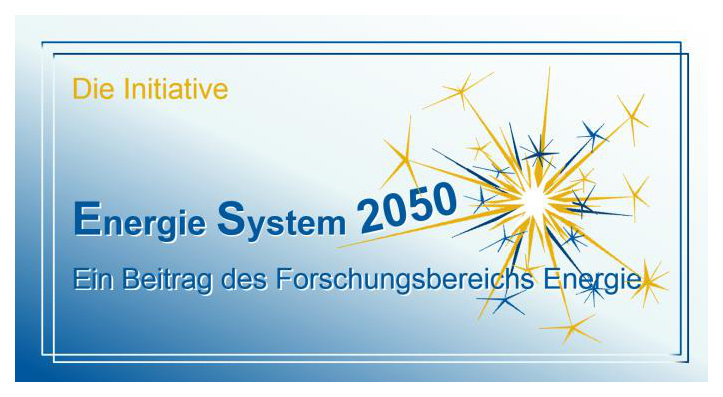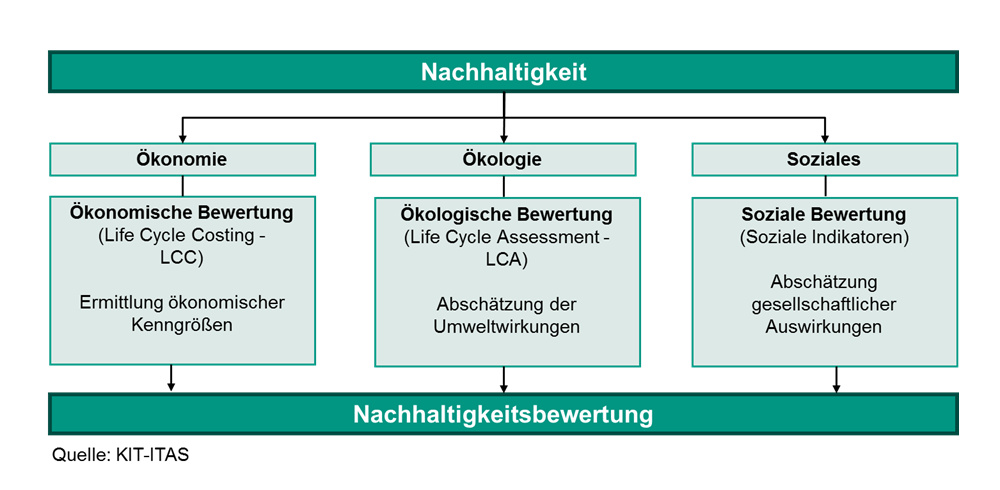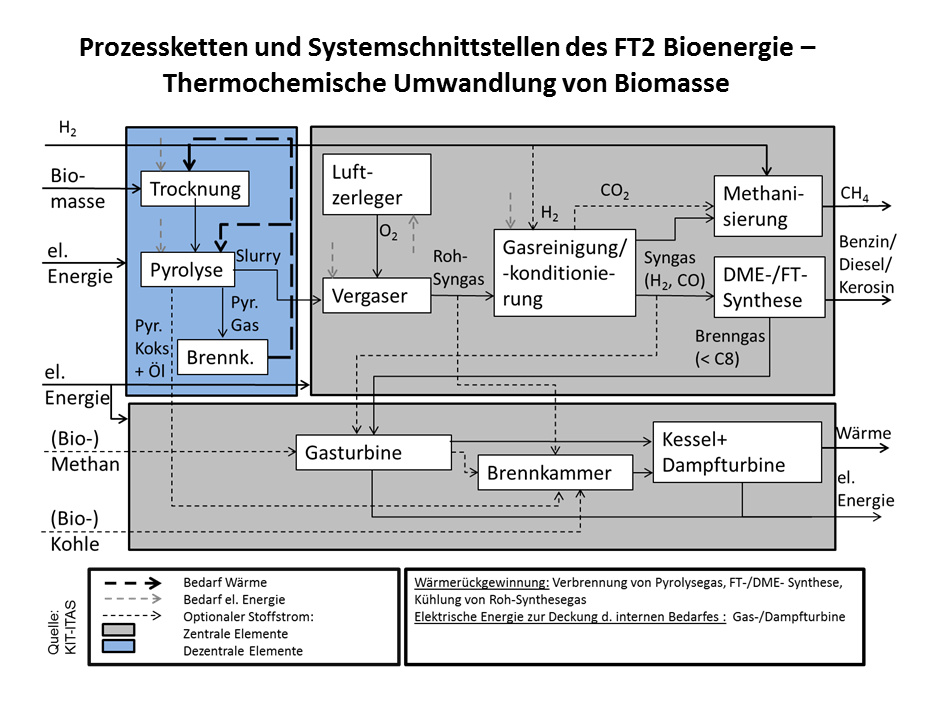Helmholtz-Initiative Energy System 2050 – Research Topic Life-Cycle-Oriented Sustainability Assessment of the Case Study Bioenergy
- Project team:
Rösch, Christine (Project leader); Martina Haase
- Funding:
Helmholtz Association
- Start date:
2015
- End date:
2020
- Project partners:
Project partner (KIT): Institute of Catalysis Research and Technology (IKFT); Institute for Micro Process Engineering (IMVT); Institute for Technical Chemistry (ITC)
- Research group:
Project description
Description of the overall initiative
"Energy System 2050" is a joint initiative of the research field energy of the Helmholtz Association. Running until 2019, it is aiming at improving the concrete understanding of energy systems and at developing technological solutions for use by politics and industry. The initiative explores the integration of technological key elements into the energy system and the respective links. It also elaborates solutions to integrate the partially fluctuating renewable energies successfully into German and European energy systems. Its five selected research topics (RT) address fundamental challenges of the Energiewende:
- Storage and Grids
- Bioenergy
- Hydrogen-based Energy and Resource Pathways
- Life-Cycle-Oriented Sustainability Analysis at System Level
- Toolbox and Data Models
Description of research topic 4: Life-cycle-oriented sustainability analysis at system level
To successfully continue and complete the Energiewende, it is important that technical and scientific, ecological, economic, and social aspects of the transformation are analyzed comprehensively and at an early stage and incorporated in the process. In research topic 4, a joint method for the sustainability assessment of technologies is developed. This method consists of the elements Life Cycle Costing (LCC) and Life Cycle Assessment (LCA) and an assessment according to social indicators (Figure 1). The method is used to assess three case studies in three research topics (RT 4.2, 4.3, 4.4) exemplarily. The findings and results of the case studies provide the basis for a sustainability assessment at the system level (RT 4.1).
Detailed information on the research topics 4.1 to 4.4 can be found at the following links:
RT 4.1: Development of Methods for Sustainability Assessment at System Level – DLR
RT 4.2: Storage and Grids – KIT-ITAS
RT 4.3: Bioenergy – KIT-ITAS
RT 4.4: Pathway Analysis Hydrogen – FZJ-IEK
Description of research topic 4.3: Case study "Bioenergy"
Based on the findings of RT 2 "Bioenergy", a sustainability analysis of the thermochemical conversion of biomass (Bioliq process chain) is carried out in this research topic.
Starting with a virtual industry location and taking into account the availability of suitable types of biomass, an economic design of the components of the Bioliq process chain for the production of liquid fuels and chemicals is carried out. The modeling of material and energy flows in the process chain provides the basis for both the design of the components and the related estimations of investments and costs. In addition, a life-cycle inventory is created along the whole value chain as a basis for the ecological assessment using the openLCA software in combination with the data base ecoinvent.
The following process steps for the production of liquid and gaseous fuels are assessed for the Bioliq process chain: Shredding and drying of biomass, pyrolysis, gasification, gas purification and conditioning, methanation, DME synthesis/Fischer-Tropsch process (see Figure 2). In addition, the gaseous components of the DME synthesis/Fischer-Tropsch process are fed into a combined-cycle gas and steam process, the pyrolysis gas is burnt in a combustion chamber (see Figure 2). The combined-cycle gas and steam process and the combustion of the pyrolysis gas are mainly intended to satisfy the internal demand for electric energy and heat. Different pathways shall be analyzed for the use of heat and electricity which are not required for intra-system processes. Both, the use by a direct heat and/or electricity consumer and the export into a local or district heating network and/or electricity grid are assessed. In addition, alternatives for a flexible operation and the coupled large-scale production of chemicals (fuels), heat, and electricity are analyzed on the basis of modeled material and energy flows. The optional material flows indicated in Figure 2 form the basis for the analysis of these alternatives.
Statements on the sustainability of the assessed bioenergy system will be made by determining economic, ecological, and social indicators for the different alternatives and the comparison of the process/system with reference processes/systems.
Publications
Prospective assessment of energy technologies: a comprehensive approach for sustainability assessment
2022. Energy, Sustainability and Society, 12 (20), Article no: 20. doi:10.1186/s13705-022-00344-6
Domestic value added as an indicator for sustainability assessment: a case study on alternative drivetrains in the passenger car sector
2022. Clean technologies and environmental policy, 24, 3145–3169. doi:10.1007/s10098-022-02402-1
Techno-economic analysis of hydrogen enhanced methanol to gasoline process from biomass-derived synthesis gas
2021. Fuel processing technology, 216, Ar.-Nr. 106776. doi:10.1016/j.fuproc.2021.106776
Multi criteria decision analysis for sustainability assessment of 2nd generation biofuels
2020. Procedia CIRP, 90, 226–231. doi:10.1016/j.procir.2020.02.124
ES2050 Bewertungskonzept zur Nachhaltigkeitsbewertung synthetischer Biokraftstoffe
2020. ES2050-Abschlusskonferenz (2020), Berlin, Germany, September 28–30, 2020
Sustainability assessment of innovative energy technologies-integrated biomass-based production of fuel, electricity and heat
2019. 27th European Biomass Conference and Exhibition, EUBCE 2019; Lisbon; Portugal; 27 May 2019 through 30 May 2019, 1642–1653, ETA-Florence Renewable Energies. doi:10.5071/27thEUBCE2019-4AV.1.13
Life cycle assessment (LCA) of the thermochemical conversion of biomass for the production of fuel, electricity and heat
2018. 26th European Biomass Conference and Exhibition (EUBCE 2018), Copenhagen, Denmark, May 14–17, 2018
FT 4.3 LCA Biogene Energieträger
2017. Gemeinsamer Workshop Integration und Vernetzung, Programm EMR Topic 4, ES 2050 Forschungsthema 2, Karlsruhe, 28.September 2017
Nachhaltigkeitsbewertung der Fallstudie Biogene Energieträge
2017. Energie System 2050, Berlin, 29.-31.Mai 2017
Die Bioenergie in der Bioökonomie
2016. Helmholtz Workshop ’Gemeinsame Forschung für die Energiewende’, Berlin, 8.-9.November 2016
Contact
Karlsruhe Institute of Technology (KIT)
Institute for Technology Assessment and Systems Analysis (ITAS)
P.O. Box 3640
76021 Karlsruhe
Germany
Tel.: +49 721 608-22704
E-mail




